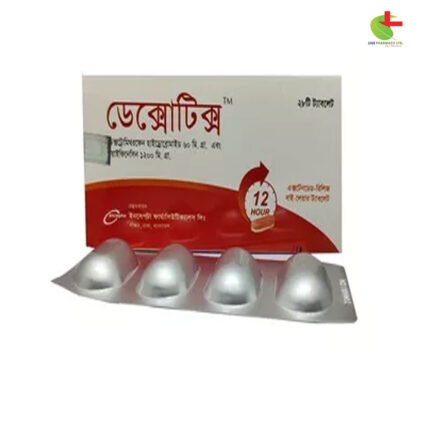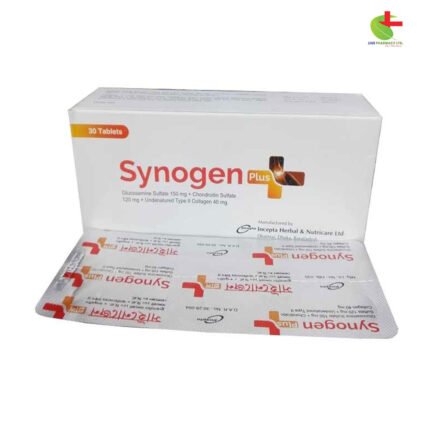Dupalaki
150.00৳ Strip(10)
- Ciprofbrate is used as an adjunct to diet and exercise for treating severe hypertriglyceridemia and mixed hyperlipidemia.
- It helps lower LDL and VLDL cholesterol while increasing HDL cholesterol levels.
- Ciprofbrate is contraindicated during pregnancy and breastfeeding and should be used with caution in patients with liver or kidney impairment.
- Side effects may include headache, dizziness, muscle pain, and gastrointestinal issues. Always follow the guidance of a registered healthcare provider.
 Brand
Brand
|
Incepta Pharmaceuticals Ltd |
|---|---|
 Generics
Generics
|
Ciprofibrate |
 Type
Type
|
Tablet |
Indications
Ciprofbrate is recommended as an adjunctive treatment to diet, exercise, and weight management for the following conditions:
- Severe Hypertriglyceridemia: Effective in cases with or without low HDL cholesterol levels.
- Mixed Hyperlipidemia: Recommended when statin therapy is contraindicated or poorly tolerated.
Always follow the advice of a registered healthcare professional.
Pharmacology of Ciprofbrate
Ciprofbrate works by lowering levels of LDL (Low-Density Lipoprotein) and VLDL (Very-Low-Density Lipoprotein), thereby reducing the associated triglyceride and cholesterol levels. It also boosts HDL (High-Density Lipoprotein) cholesterol. This medication is particularly useful for managing hyperlipidemia in patients with elevated LDL and VLDL plasma concentrations. Research suggests that fibrate treatment may also help lower the risk of coronary heart disease.
Dosage & Administration
- Adults: The standard dosage is 100 mg per day. This should not be exceeded.
- Renal Insufficiency: For patients with moderate renal impairment (creatinine clearance 30-80 ml/min/1.73 m²), it is recommended to take one tablet every other day. Close monitoring is essential. Ciprofbrate is not suitable for patients with severe renal impairment (creatinine clearance <30 ml/min/1.73 m²).
- Hepatic Insufficiency: Caution is advised for patients with liver issues. Ciprofbrate should be discontinued if there is a significant increase in AST and ALT levels (greater than 3 times the normal upper limit) or evidence of cholestatic liver injury.
- Elderly Patients: The dose is the same as for adults, but extra precautions should be considered for individuals over 70 years of age.
- Pediatric Use: Ciprofbrate is not recommended for children due to the lack of established safety and efficacy data.
Consult a registered healthcare provider before using this medication.
Drug Interactions
- Fibrates & HMG-CoA Reductase Inhibitors: Co-administration with other fibrates or statins (HMG-CoA reductase inhibitors) may increase the risk of myopathy, rhabdomyolysis, and myoglobinuria.
- Oral Anticoagulants: Caution is necessary when Ciprofbrate is used with oral anticoagulants. The anticoagulant dosage may need to be reduced and adjusted based on INR (International Normalized Ratio) levels.
Contraindications
Ciprofbrate should not be used in individuals with:
- Allergic reactions to the active substance or any excipients
- Severe hepatic impairment
- Severe renal insufficiency (creatinine clearance <30 ml/min/1.73 m²)
- Pregnancy or breastfeeding
- Concurrent use of another fibrate
Side Effects
Common side effects may include:
- Headache, dizziness, and somnolence
- Nausea, vomiting, and diarrhea
- Abdominal discomfort, dyspepsia
- Skin rash, alopecia
- Muscle pain, fatigue
Pregnancy & Lactation
While Ciprofbrate has not been shown to be teratogenic, high doses in animal studies indicated potential toxicity. Due to the lack of human pregnancy data, Ciprofbrate is contraindicated during pregnancy. It is also not recommended for breastfeeding mothers due to insufficient safety data.
Precautions & Warnings
- Galactose Intolerance: Ciprofbrate is not recommended for individuals with rare hereditary conditions such as galactose intolerance, lactose deficiency, or glucose-galactose malabsorption.
- Muscle Issues: Patients should immediately report any unexplained muscle pain, tenderness, or weakness.
- Liver Function: Periodic liver tests are advised during the first 12 months of treatment. If there is any significant rise in AST and ALT levels (over three times the normal limit), or signs of cholestatic liver damage, Ciprofbrate treatment should be stopped.
Therapeutic Class
Ciprofbrate belongs to the class of anti-hypertensive drugs and other anti-anginal & anti-ischemic medications.
Storage Conditions
Store Ciprofbrate below 30°C, away from light and moisture. Keep it out of the reach of children.

![Dupalaki - Effective Treatment for [Indication] | Live Pharmacy Dupalaki - Effective Treatment for [Indication] | Live Pharmacy](https://livepharmacy.com/wp-content/uploads/2024/11/Dupalaki.jpg)











Reviews
There are no reviews yet.